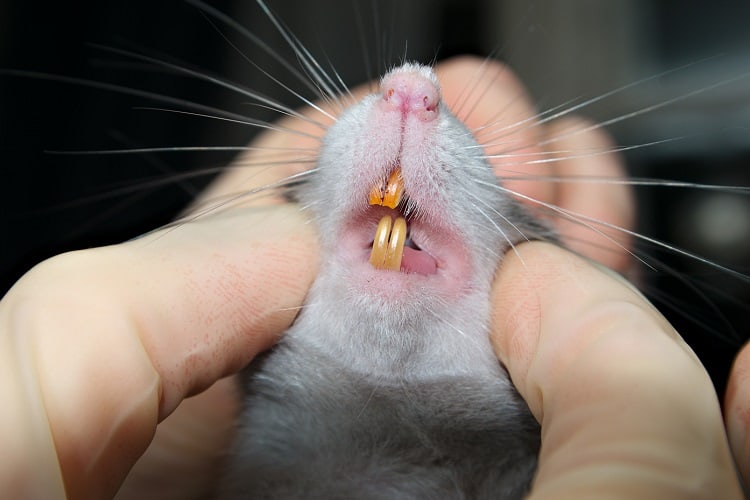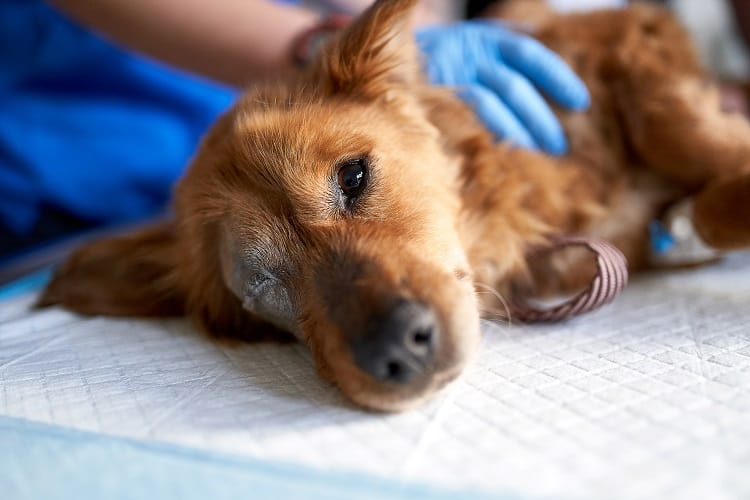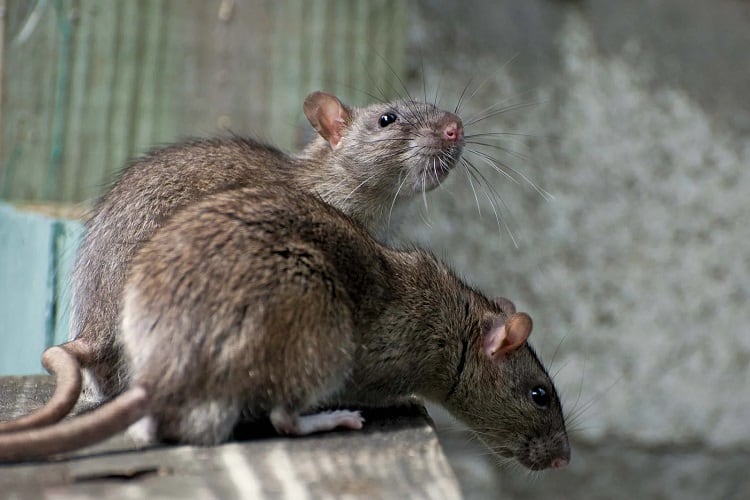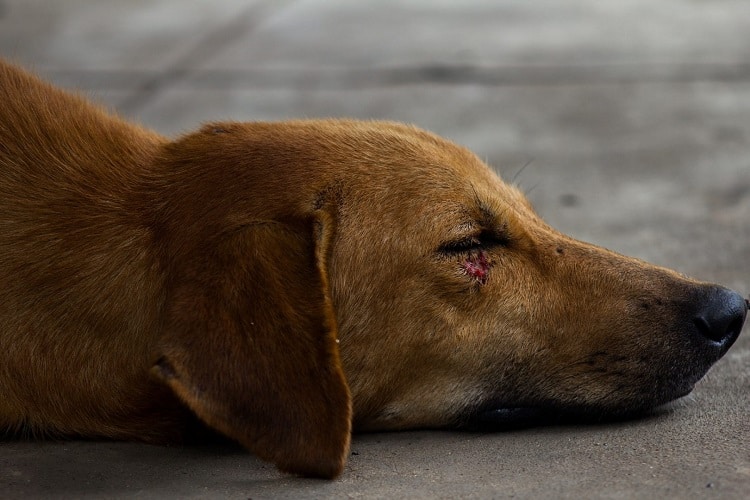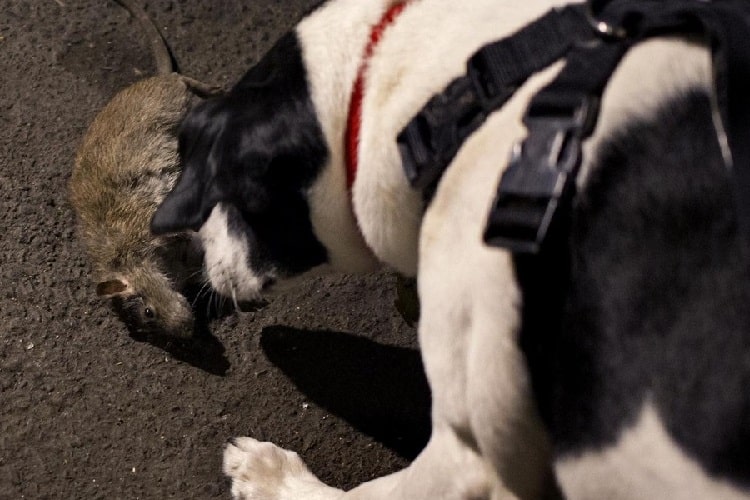Our dogs love to chase anything that’s moving whether they’re vehicles or small animals.
While the behavior is more common among sighthounds and herding dogs, many breeds can also be taught to hunt down rats.
Indeed, it’s good to get rid of vermin but it isn’t necessarily a safe encounter for dogs.
Rats can carry germs and communicable diseases which may be harmful to your pets. Even a minor rat bite on dog should be given immediate medical attention to ensure that your dog isn’t at risk for certain illnesses.
If your dog is in the habit of chasing down rats, here are things that you must keep in mind in case of rat bites.
Are Rat Bites Dangerous for Your Dog?
A rat bite can be pretty dangerous for your dog as it can lead to nasty diseases, especially if your dog is unvaccinated against leptospirosis and other illnesses.
If your dog suffers from a severe rat bite or gets bitten by an infected or poisoned rat, it may also prove to be fatal.
If your furry companion is bitten by a rat, it’s best to seek the advice of a vet at the soonest possible time. Get your dog the medical care it needs to keep it safe and healthy. Regular vaccinations can also prevent diseases.
Diseases That Rat Bites Can Spread to Your Dog
Here’s a list of diseases that you need to watch out for if your pet is exposed to rats:
1. Infection
If your dog gets bitten by a rat, it may develop an infection. This is more likely if the bite is deep. Infected bite wounds are usually painful, swollen, red, and may also be filled with pus.
If the bite isn’t treated soon enough, the infection can reach the bloodstream and result in a life-threatening disease called sepsis.
This occurs when the body’s natural response to infection starts damaging its own tissues and organs, leading to inflammation throughout the body.
2. Leptospirosis
Leptospirosis or “lepto” is a bacterial infection that is caused by the Leptospira bacteria. This bacteria is usually transmitted from carrier animals such as rats, mice, squirrels, and other rodents as well as farm animals like horses and cows.
Dogs usually contract it when they come in contact with urine from an infected carrier animal. However, a rat bite, contact with an infected animal, or drinking contaminated water can also cause leptospirosis.
This disease is more common in tropical and warm areas with high rainfall but can still be contracted from anywhere in the world. Since it has many different strains, its symptoms can vary and their intensity can range from mild to severe.
Leptospirosis is usually serious and can even be fatal. Moreover, it can also affect humans and be transmitted by animals.
If a dog contracts leptospirosis, it may severely damage the liver and kidneys. It can also cause inflammation, muscle pain, bleeding, and respiratory diseases. The signs of leptospirosis for dogs include the following:
- Fever
- Lethargy
- Loss of appetite
- Muscle pain or twitching
- Abdominal pain
- Vomiting
- Diarrhea
- Bleeding from the nose, in the feces, or in vomit
- Change in the frequency of urination
- Jaundice
3. Rat Bite Fever
Around 10% to 100% of domestic rats and 50% to 100% of wild rats carry the Streptobacillus moniliformis bacteria.
This causes an illness called rat bite fever (RBF). Infected rats are known to transmit RBF through bites and scratch wounds but RBF can also come from contact with the urine or droppings of an infected rat.
Dogs are usually considered carriers of RBF and may not show any symptoms of the disease. However, there have been rare instances when dogs also have fallen ill to RBF.
4. Rat Poison
If your dog is bitten by a rat that was poisoned, your dog may also be poisoned. Rat poison is deadly for dogs and requires urgent medical attention.
5. Intestinal Parasites
If your dog eats an infected rat or gets bitten by one, it can put your pet at risk of contracting intestinal worms such as roundworms, tapeworms, and so on.
Intestinal parasites feed on the nutrients from your dog’s gut and can cause health issues such as weight loss, diarrhea, vomiting, and lethargy.
What To Do When a Rat Bites Your Dog
If a rat bites your dog, here’s what you can do to help your dog recover:
1. Gather All the Details
If your dog gets bitten by a rat, quickly gather all the relevant information you need to understand the situation better. You’ll need to relay this information when you visit your vet.
Knowing what happened and having important details will help your vet identify the possible health risks so that they can provide the right treatment for your dog.
Did you notice your dog chasing or catching a rat? Did you see a rat bite or scratch your dog? Did your dog eat or bite the rat? When and where did it happen? Was rat bait or rat poison used on the property? If so, what type and brand was it?
If you suspect that your dog might have somehow ingested rat poison and you have its packaging, show it to your vet because it might help.
2. Possible Treatments
A rat bite on a dog needs immediate veterinary attention. The wound needs to be professionally cleaned and disinfected as soon as possible.
The vet will also do lab tests to check if your dog has contracted an illness. The tests will help determine the right course of treatment and prevent any health complications. Your vet may also prescribe a course of antibiotics for your dog.
If your dog shows any signs of leptospirosis, seek medical care immediately. Early diagnosis and treatment are key to helping your dog recover. There are also leptospirosis vaccinations available for dogs older than 8 weeks. Make sure that your dog gets its booster shots on time to prevent the disease.
If your dog gets bitten by a poisoned rat, inform your vet about the type and brand of rat poison in case you know these details.
A dog that has contracted intestinal parasites will require deworming. Your vet will be able to tell you which deworming treatment is best for your dog.
Your vet may also advise you to deworm your pet more often to prevent intestinal worms. Moreover, you can get your pet to undergo regular fecal testing to screen and check it for worm infestation.
How To Recognize a Rat Bite
A rat bite on dogs usually looks like a small puncture wound or small cuts on the body. The wound or cuts may appear swollen or red or may bleed and cause pain. If the rat bite gets infected, you may also find some pus.
If you aren’t sure if your dog was bitten by a rat or if you can’t immediately locate the bite, keep an eye on your dog to check for any troubling signs or symptoms.
Your dog may appear quieter than usual, have a fever, be lethargic, or seem uninterested in eating. It may also suddenly start urinating more or less frequently.
Your pet may also suffer from joint pain, muscle pain, abdominal pain, headaches, rashes, vomiting, diarrhea, jaundice, nose bleeds, or have blood in its feces or vomit.
Can You Prevent Rat Bites on Your Dog?
To prevent rat bites on your dog, try the following:
1. Restrict Access
Your dog will most likely encounter rats outside the house. Keep your pet indoors to prevent it from chasing, catching, or playing with rats.
If a rat was spotted inside your home, limit your pet’s access to the rat or its surroundings since there might be droppings or urine in the area. You may have to confine your dog to a different room as you clean. Also, wear gloves to protect yourself while cleaning.
2. Curb the Rat Infestation
If rats live on your property or inside your home, take steps to get rid of them to prevent rat bites.
Store food in airtight containers, secure all trash in closed bins, keep a lid or another type of covering on compost, and trim the bushes and other plants to keep away rats. Also, avoid keeping pet food out at night.
Moreover, avoid using rat poison on your property. Use ultrasonic rat repellents instead and other humane rat repellent products to eliminate rats and keep them at bay.
If you still can’t get rid of them, call a pest control company to help you deal with the infestation.
Conclusion
A rat bite on dogsis a serious matter as it can prove dangerous and even fatal. Take steps to prevent your dog from getting bitten by ensuring that your property is free of rats.
In the event of a rat bite, take your dog to the vet immediately so it receives the medical attention it needs. Timely medical care can help your dog recover and keep it safe from diseases.
We hope our guide helped you understand how to deal with rat bites on dogs.
If you enjoyed our article, look through Dog Temperament for more useful guides and posts like this. Don’t forget to share this article with other dog lovers and pet parents so that they too can benefit from it.

Dan is a well respected content researcher who has vast experience working projects in the pets niche. He is a frequent contributor to dogtemperament.com and loves delivering numerous helpful dog articles like this one that are read by thousands of our readers monthly.
